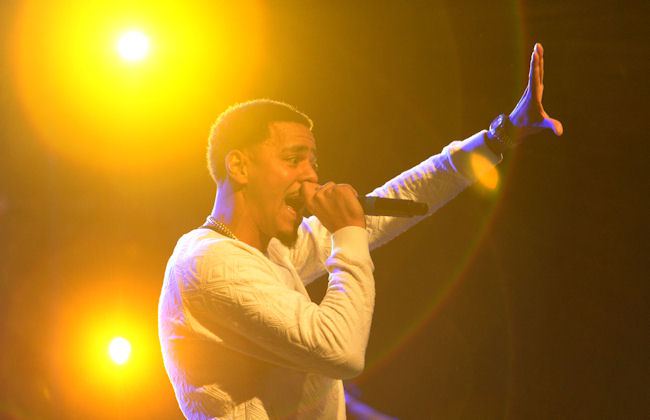
Words By Emanuel Vinson
Last year, Hip-Hop/R&B album sales experienced a 25% decline, the biggest fall industry-wide across the different genres. In a year where race and class rose to the forefront of hip-hop’s discussion topics, it asks us to take a deeper look at the culture and what we expect out of it.
J Cole’s unassuming, hungry 2014 Forest Hill Drive had the highest first week sales in hip-hop in 2014. It handily dispatched its nearest competitor, Nicki Minaj’s The Pinkprint by about 100k.
The difference between the two album launches looked considerable: Cole stayed quiet all summer and his announcement for 2014FHD came less than three weeks before the album reached the fans. Minaj, a certified pop star, hovered around the mainstream for months releasing singles upon singles and freestyle after freestyle without really making the mark.
Nicki’s most rewarding surprise was her last: imbuing the album with the kind of universal vulnerability that Cole has been exhibiting his entire career. But even as Cole’s straight-forward “realness” triumphed, his genre remained the dark horse in a crucial time of transition.
Months after the killing of Mike Brown, Azealia Banks gave a furious, fantastic interview with Hot 97 where she called out Iggy Azalea’s pop dominance as a direct result of black erasure. Iggy played it off, but numbers don’t lie. By that point Taylor Swift’s 1989 became the top selling album of the year. That album’s big singles, “Shake It Off” and “Blank Page” both prominently feature rhyming spoken word and drum machines.
Billboard’s highest selling songs from 2013 and 2014 (“Blurred Lines” and Pharrell’s “Happy”) classified as R&B/Hip-Hop songs. And as far as Billboard’s “Song of the Year” bracket went, Beyoncé and Jays “Drunk in Love” bested Disclosure’s “Latch” in a soulful finals showdown. But what if it hadn’t?
As 2015 begins, what we do expect from the industry? Do we really expect the artists we love to be able to eat? Do we always expect Iggy to outsell Azealia or for Nicki to drop the same song as Taylor Swift and get a fraction of the attention for it? Is the music enough?
As 2015 begins, use of streaming services is still on the rise, especially with rap audiences. “R&B and hip hop are popular on streaming sites,” Billboard states, “And streamed tracks increased 54 percent last year.” Reportedly, Cole’s project was streamed a whopping 16 million times in its debut week, breaking One Direction’s record and contributing greatly to Cole’s overall sales count, given the recent changes to the format for counting streams towards sales. Obviously, streaming isn’t killing the music industry but those streams translate to very little in the form of compensation.
Black artists and artforms are running the industry but still getting the least amount of compensation and credit. And the artists aren’t staying quiet about it anymore. If you don’t know, now you know: Kanye, Drake, and Kendrick can’t do it alone in 2015.

Debonair
Black artists and black radio keep playing pornographic and vulgar music on the daily and then they are surprise when their songs don’t crossover to mainstream radio. I never realized how dirty black radio was until I switch back to Top 40 for a few weeks and then came back to it. The shit is depressing to listen man. The movie business understood this long ago. It’s a reason why most movies are PG-13 now because it allows you to reach the board audience possible. Black artists keep making music for the ratchet and that will be the only people listening.
Romelle
@Debonair that’s the truth. I can’t listen to some the music that comes out for that very reason. The music that I think is good music doesn’t get the same attention as “what’s hot” in mainstream music. Our mainstream music has become pop as in bubble gum, because we’ve fused hiphop and r&b together. Sure it sounds good, but the messages in our music isn’t mature enough to settle in and stick like it use to, and we’re putting out too much music that follow the same formulas. its hot, but its still mediocre compared to old school urban music.
I think urban music use to crossover because the content in our music was either relatable or acceptable for all audiences.
(20 years ago) http://www.billboard.com/charts/hot-100/1995-01-07
I’m not sure where album sales will be in 2015. One of the of the best selling urban albums, in 2014, came from D’Angelo and he released it surprisingly. I think Jodeci’s album will sell this year and they’re not even on a major label label. I think these real artists who have a decent sized fan base will thrive for the most part because they’ve proven themselves over the years.